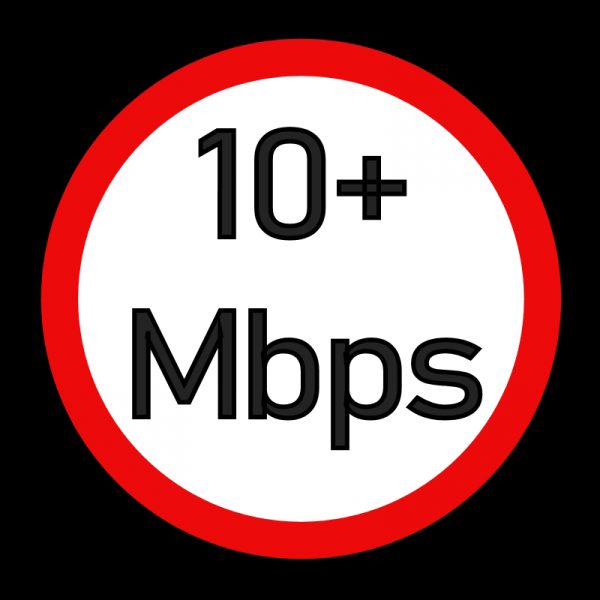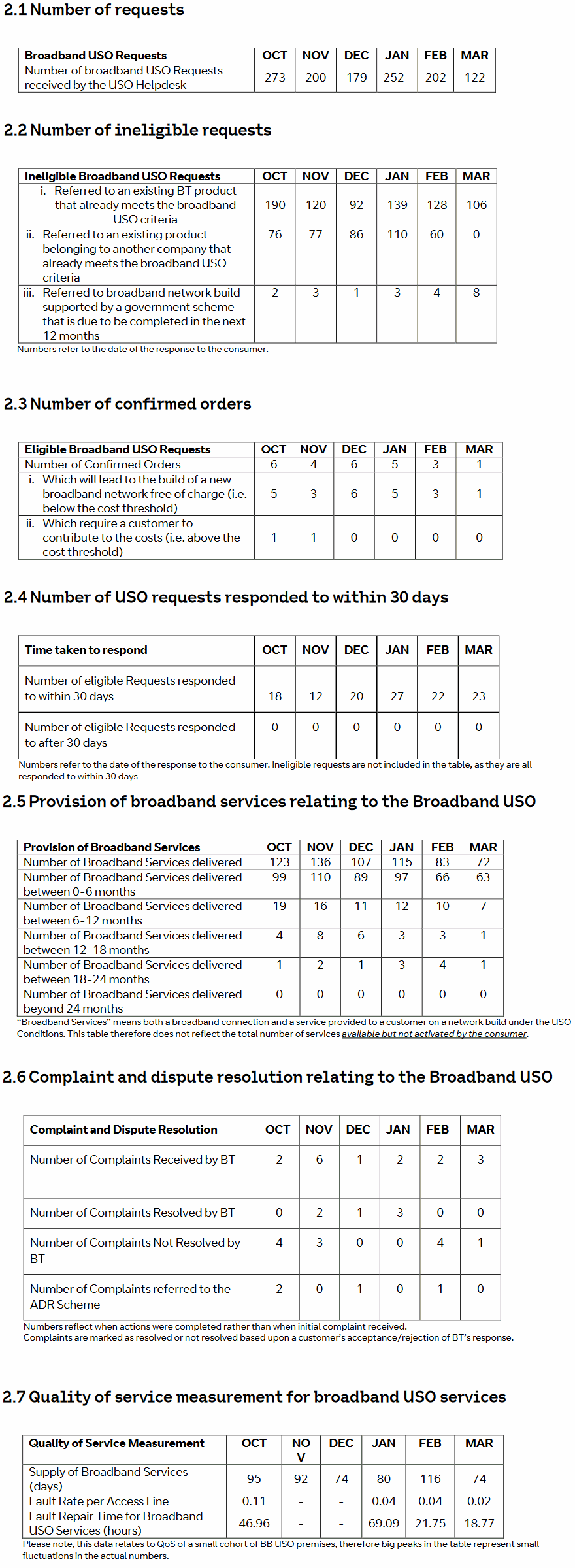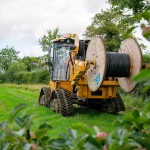April 2024 BT Progress Update on the 10Mbps UK Broadband USO

UK ISP BT has today published the latest biannual progress update on their delivery of Ofcom’s flaky 10Mbps Universal Service Obligation (USO) for broadband. The internet provider has so far helped to build a USO connection to over 7,954 premises (up from 7,681 in Oct 2023), with 265 further builds in-progress (up from 185).
The USO, in case anybody has forgotten, is a legally-binding and industry-funded obligation that falls on BT across the UK, as well as KCOM in Hull. In short, people living in areas where they can’t yet receive a 10Mbps or faster download speed, and aren’t expected to be covered by such a network in the next 12-months, can request a service capable of 10Mbps+ downloads (1Mbps upload) from the aforementioned providers.
A cost sharing model also applies here, which means that the providers will “calculate the total excess cost of the build and divide that between the eligible premises. If that amount is below £5,000 per premises (on top of the £3,400), we’ll automatically split the costs“. But some areas can still end up costing hundreds of thousands of pounds, even up to £1-2m, and would thus find the USO route to be unviable (here and here).
Advertisement
Ofcom states that 57,000 UK premises (0.2%) currently fall into the USO gap (i.e. those outside of suitable fixed line, fixed wireless and 4G mobile coverage), which rises to around 400,000 premises if you exclude wireless solutions. But the regulator expects this to fall to around 50k by September 2024, mostly as a result of upgrades via publicly funded schemes (connection vouchers, project gigabit contracts etc.).
Just to be clear about this. Many of those who pursue the USO option via BT say they were offered 4G (mobile broadband) connections via EE, but those actually considered to have been delivered under the USO itself usually get Fibre-to-the-Premises (FTTP). Commercial builds of the latter have also helped to shrink the USO gap.
The gap will continue to shrink as commercial builds expand and the government’s £5bn Project Gigabit programme starts to make progress. The government are currently also exploring how best to reach those who live in “Very Hard to Reach” areas – roughly equating to the same sort of area as the USO is focused upon – and at the same time they’re preparing to review the USO itself (here), which could lead to changes.
BT’s April 2024 USO Report
The latest statistics continued to show that the delivery of USO connections is slow (e.g. over a year ago there were 2,000 builds in progress, which fell to 800 in Apr 2023, then 185 in Oct 2023 and increase a bit to 265 now). We suspect this may be a combination of factors, such as a lack of consumer familiarity with the USO (apply for it here) and the fact that the policy may also be starting to run into the limitations of economically viable deliverability.
Advertisement

Mark is a professional technology writer, IT consultant and computer engineer from Dorset (England), he also founded ISPreview in 1999 and enjoys analysing the latest telecoms and broadband developments. Find me on X (Twitter), Mastodon, Facebook, BlueSky, Threads.net and Linkedin.
« Virgin Media O2 See Nexfibre Add 194k UK FTTP Premises as Growth Slows
UK Fibre Networks Ltd to Expand FTTP Broadband Beyond York »






















































Using 4G connections to fulfil USO requests should never have been an option in the first place, or at least very heavily price controlled.
BT is absolutely criminal in this respect and charge £53 per month for a 4G connection with a maximum speed of 15mb/s. If you want to bump up to 30mb/s (if your connection can even reach that speed) then you’ll be paying £75 per month. Basically their way of saying “sod off and go with someone else”.
the 4G for USO was agreed with ofcom as aone of the USO delivery methods (based up to 3250 premise) and subject to full procurement — no one wanted to bid USO except BT and Kingston — as some one once said no goodness is USO period — that why no one else went anywhere near it –
At £75 per month, one would surely be better off with Starlink?…
And that’s a problem because…? Just “go with someone else” as you say. No other company is bound by USO. It’s the same tactic used by tradesmen and others around the world.
Couldn’t agree more I tried BT before they imposed the speed limits and it was horrendous they’re supposed to be using reserved spectrum ensuring the contention ratio remains below 50:1 but my experience was vary far from that fortunately they started limiting the speed which amounted to a breach of contract so I was able to get out of that one. but that seems to be a familiar theme across all the networks at least where I reside. Certain times of day the networks (I’ve tried Three, Vodafone, EE & O2) all get so congested that often just making a video call becomes almost impossible. The only solution I’ve found capable of supplying a “decent” connection is Starlink but that’s obviously way more than the USO’s £56. Sadly the USO has proven itself time and time again to be almost worthless as there where so many compromises made it lost all effectiveness.
What about Starlink?
Openreach abandoned upgrading most of Bradley Stoke to fibre where many streets are on almost unusable sub megabit speeds, 4G is almost non existent. I am forced to pay virgin up the nose for a usable internet connection because of Openreach’s lack of rollouts.
If you have a usable internet service through Virgin what you on here complaining about?? You are not a priority, lots of properties are in more urgent need.
You’re posting on an article about folks with no access to anything reaching 10 Mb complaining about having access to gigabit.
so just so i got this correct your unhappy a commercial operator (openreach) has made a decision around where to spends its money (not pub but it own) and has decided not to overbuild the virgin network that is in your road already because you not happy with virgin Media service and your grumping like a 4 year old with the commercial sense of one !!!!
unbeleivably selfish
If you want it that bad im sure Openreach / Cerebas or AN other will provide you a FOD cost at suitable commercial rates
I wonder how many addresses incorrectly identify households as not served? My friend’s remote village had FTTH inrfra put in a couple of years ago and all the houses are served – there’s even a fibre CBT pole in his garden (he receives wayleave payments!), but Openreach (& BT and all the other ISPs) refused to accept his property address was served and he was quoted £34,000 for connection. Of course the database was wrong, but try fighting with “Computer says no” idiots. How on earth did they survey the premises to come up with that quote? Eventually he got the database corrected but I am sure in rural areas there are plenty of mismatched records.